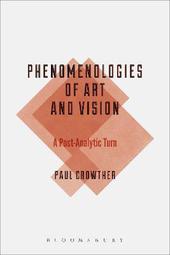
|
Phenomenologies of Art and Vision: A Post-Analytic Turn
Paperback / softback
Main Details
Description
Contemporary discussions of the image like to emphasize art's societal functions. Few studies come close to answering why pictures and sculptures fascinate and intrigue regardless of any practical functions they might serve. In this original, thought-provoking study, Paul Crowther reveals the intrinsic significance of pictures and sculptures. To address the question of how painting becomes an art, Crowther uses the analytic philosophy of Richard Wollheim as a starting point. But to sufficiently answer the question, he makes an important link to a tradition much more successful in giving voice to the deeper ontology of visual art - existential phenomenology. The result is a work that demonstrates the reciprocal relationship between phenomenology and analytic aesthetics. To expand its ontological scope and solve the problem of expression, analytic aesthetics needs phenomenology; while to develop a sustained, critically balanced, and intellectually available ontology, phenomenology needs the discursive force and lucidity of analytic philosophy. This convincing case for a post-analytic phenomenology of art is an important advancement of contemporary discussions of the philosophy of art.
Author Biography
Paul Crowther is Professor of Philosophy at the National University of Ireland, Galway.
ReviewsWhat is most satisfying in Crowther's study is the degree to which his discussion concerning treatments of art and aesthetics maintains a discussion with actual works of art. While I might not always agree with where this leads his discussion of Heidegger and others, his analyses are nevertheless generally defensible. And while I might prefer others who treat Heidegger, Kant, Hegel, etc. and art -- I am thinking here especially of John Sallis -- I can think of no one who treats such variety in art as Crowther. I find this most recent addition to his extensive accounting of art and those who think about art most rewarding, and I recommend it to all. -- Jeffrey Powell, Marshall University * Notre Dame Philosophical Review * Paul Crowther has created an important body of philosophical writing about visual art. The present work develops it further. -- Elena Fell * British Journal of Aesthetics, vol 54, no. 4 *
|